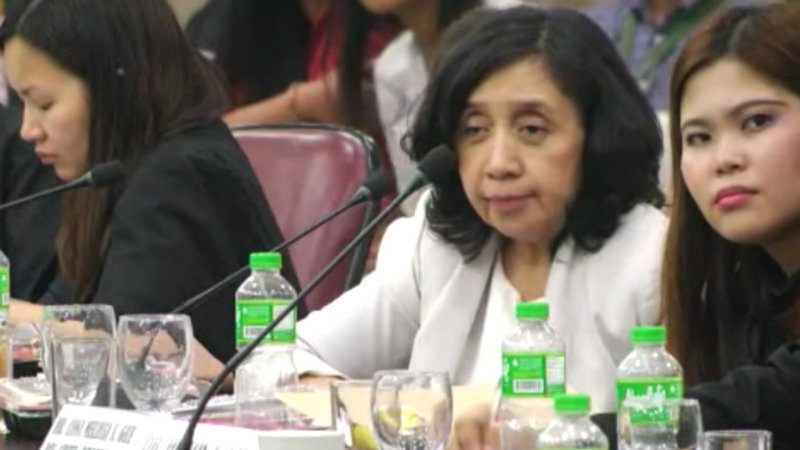SUMMARY
This is AI generated summarization, which may have errors. For context, always refer to the full article.


MANILA, Philippines – A day after she was berated before a House panel for supposed “conflict of interest” in a study on a now-controversial dengue vaccine, a Filipino scientist said on Tuesday, February 6, that experts have nothing to do with the eventual registration of a medicine or vaccine.
In a statement to media, Research Institute for Tropical Medicine (RITM) Microbiology Department and Dengue Study Group head Ma. Rosario Capeding said that she never recommended the registration and issuance of a license for Dengvaxia, contrary to the assertions and insinuations of a lawmaker.
“Hindi kailanman nagbigay si Dr. Rose Capeding ng anumang rekomendasyon tungkol sa pag-rehistro o pag lisensya ng Dengvaxia sa FDA (Food and Drug Administration) or DOH (Department of Health). At hindi rin hiningi ng FDA o ng DOH ang rekomendasyon ni Dr. Rose Capeding sa pag register or paglisensya ng Dengvaxia,” she said.
(Dr. Rose Capeding never gave recommendations connected to the registration or licensing of Dengvaxia before the FDA or DOH. Neither did the FDA or the DOH ask for Capeding’s recommendation regarding the registration and licensing of Dengvaxia.)
During a Monday, February 5 probe into alleged anomalies in the procurement of Dengvaxia vaccines for a mass immunization program, Nueva Ecija 1st District Estrellita Suansing accused Capeding of “conflict of interest” since she conducted the clinical study on the breakthrough vaccine through a grant from its manufacturer, Sanofi Pasteur.
Capeding got P40,000 monthly for the study, which was conducted from 2011 to 2017. Suansing highlighted this during the hearing, accusing Capeding of publishing results in favor of Dengvaxia because she was paid by its manufacturer.
“Here’s the conflict of interest. Ang FDA uses your report to approve the registration of the product. Tapos, Sanofi nag-commission sa iyo. Eh alangan naman, binayaran ka…alangan naman di ka maglabas ng positive report. Grabe naman ‘yun ‘pag maglalabas ka ng negative result?” said Suansing, who had earlier filed a resolution calling on the House to probe the program.
(The FDA used your report to approve the registration of the product. And it’s Sanofi which commissioned you. Of course, because they paid you, don’t tell me you won’t come up with a positive report? It’s hard to imagine that you would come up with a negative result.)
In the statement, Capeding explained that despite Suansing’s insinuations and allegations, her study was not influenced
The Philippine government’s procurement of over P3 billion in vials for a mass immunization program is the subject of probe by both chambers of Congress. The program, controversial since its inception over concerns by experts regarding the lack of long-term studies on the vaccine, was stopped after Sanofi itself revealed in December 2017 that the vaccine was not safe for those who had yet to be infected with the dengue virus.
Sanofi issued the warning because the new findings only came out at the end of the 6-year-long study.
How clinical trials work
Capeding, aside from being chief of the Microbiology Department and Dengue Study Group at RITM, is an expert in both dengue research and pediatrics. She is a fellow and diplomate of both the Philippine Pediatric Society and the Pediatric Infectious Disease Society of the Philippines.
She was also awarded the 23rd Dr Jose P. Rizal Memorial Award for Research in 2014 by the Philippine Medical Association. She is a member of the advisory board of the Prevention for Dengue Control (Global).
Capeding said that various steps in clinical trials ensure that the results are untainted by any possible bias.
“It’s clear that in the entire process, there is never conflict of interest even if there is a research grant from a pharma company because scientists and medical researchers scrutinize each step of the process and the data that comes out of the clinical trials,” she said.
According to Capeding, clinical trials are guided by a protocol. In the case of the dengue clinical trial, the protocols were approved by the United States Food and Drug Administration, the European Medicine Agency, and the World Health Organization before it was eventually submitted to the respective regulatory agencies of the countries in which Sanofi applied for Dengvaxia registration.
After further revisions to the protocol and other documents, the clinical trial protocol was eventually approved by 10 countries and 27 institutional and ethics committees.
In the Philippines, in particular, the clinical trial was approved by the FDA, the RITM Institutional and Ethical Review Board, the Vicente Sotto Institutional and Ethical Review Board, the Chong Hua Hospital Institutional and Ethical Review Board, and the Walter Reid Army Institute of Research.
Capeding said the following things were observed during the clinical trials:
- Volunteers were given information about the trial and had to sign consent forms;
- The story was randomized and observer-blind, meaning the vaccines and placebos were packaged similarly meaning neither the doctor, the nurse, or the subject were aware if they were getting the vaccine or the placebo;
- Only a third party was privy to the “randomization codes”;
- Analysis of the data was not conducted by local teams. Instead, it was entered into an “electronic data capture”;
- Clinical trials sites from around the world encoded their data and submitted blood samples;
- Later on, an “independent contracted research organization” visited the trial sites to verify the data submitted
The results, Capeding said, where then submitted by Sanofi to an independent data monitoring committee composed of scientists not connected to the company. It’s this committee that eventually makes the recommendations regarding the vaccine.
Once the report is out, Capeding explained, the 36 “principal investigators” release the results to medical journals. There then under scientific peer reviews, meaning their colleagues scrutinize their work.
Read her full statement and explanation of clinical trials here:
– Rappler.com
Add a comment
How does this make you feel?
There are no comments yet. Add your comment to start the conversation.